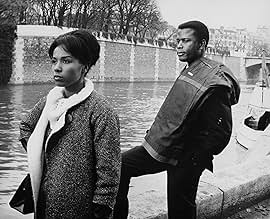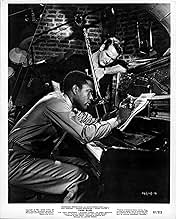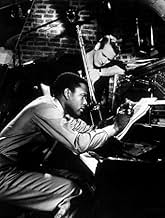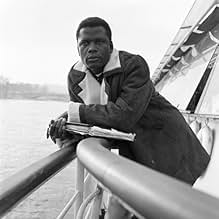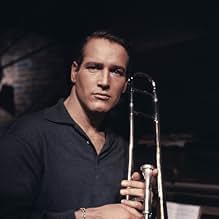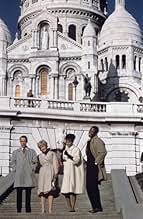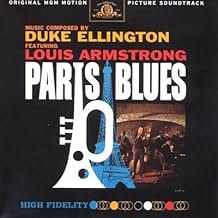IMDb RATING
6.7/10
4.4K
YOUR RATING
During the 1960s, two American expatriate jazz musicians living in Paris meet and fall in love with two American tourist girls.During the 1960s, two American expatriate jazz musicians living in Paris meet and fall in love with two American tourist girls.During the 1960s, two American expatriate jazz musicians living in Paris meet and fall in love with two American tourist girls.
- Nominated for 1 Oscar
- 2 nominations total
Guy Pedersen
- Bass Player
- (as Guy Pederson)
Roger Blin
- Guitarist Fausto the Moor
- (uncredited)
Charles Bouillaud
- Luggage Carrier in Train
- (uncredited)
Michel Dacquin
- Guest at Devigne's Party
- (uncredited)
Hélène Dieudonné
- The Pusher
- (uncredited)
Michel Garland
- Club 33 Customer
- (uncredited)
Featured reviews
Within 2 years of "Paris Blues" being released the US involvement in Vietnam began to sour the relationship between America and la rive gauche. French intellectuals affected to disdain the United States and all its works;one of the few aspects of Americana that were permitted to be still admired was jazz music. Even so the myth of the American jazz musician as a god-like figure had faded by the mid sixties.Giants like Louis Armstrong and Duke Ellington were still revered but the journeymen jazzers like Ram Bowen(Newman)no longer filled the clubs just because they were American. The Indian Summer of America's honeymoon with Europe peaked with "Paris Blues".
Beautifully shot in black and white in the quintessentially Parisian parts of the city where the 2 pairs of lovers could stroll hand in hand photogenically it was a love letter to the arondissements beloved of Scott Fitzgerald,Hemingway and Gertrude Stein 30 years after the affair had ended.
Paul Newman was never more charming,Sidney Poitier never more cool and self-effacing;their pairing considered quite daring at the time coming just a few years after the ground-breaking "The Defiant Ones". Duke Ellington wrote the score and his "Mood Indigo" is beautifully played by Murray McCeachern.Louis Armstrong plays himself - why his character is named Wild Man Moore one can only speculate.
I saw "Paris Blues" when I was 20 years old and my love affair with jazz was a its height. Looking at it now it doesn't seem all that special,the characters and situations have all become clichés;but perhaps that's a bit like saying "Hamlet"'s a good play but it's full of quotations.
Beautifully shot in black and white in the quintessentially Parisian parts of the city where the 2 pairs of lovers could stroll hand in hand photogenically it was a love letter to the arondissements beloved of Scott Fitzgerald,Hemingway and Gertrude Stein 30 years after the affair had ended.
Paul Newman was never more charming,Sidney Poitier never more cool and self-effacing;their pairing considered quite daring at the time coming just a few years after the ground-breaking "The Defiant Ones". Duke Ellington wrote the score and his "Mood Indigo" is beautifully played by Murray McCeachern.Louis Armstrong plays himself - why his character is named Wild Man Moore one can only speculate.
I saw "Paris Blues" when I was 20 years old and my love affair with jazz was a its height. Looking at it now it doesn't seem all that special,the characters and situations have all become clichés;but perhaps that's a bit like saying "Hamlet"'s a good play but it's full of quotations.
If you're looking for a film on the level of Godard's "Breathless" , which was made in the same year (1961), forget it. Belmondo and Seberg coolly ride the crest of the New Wave in some other Paris. But there's never a good reason not to see Louis Armstrong, who is wonderful, so if nothing, see it for him. And where else are you going to get Paul Newman and Sidney Poitier hanging out in a jazz cave with hipsters looking like they just flew in from planet square, but in the process looking a lot cooler than the people trying to look cool.
The love scenes are as melodramatic and corny as they can be, bordering on camp, with a lot of hand wringing and flinging about and running, but c'mon! Newman and Woodward and Poitier and gorgeous Diahann Carroll? Rent this with Diva or Charade or both and it can be a Paris street scene night., although Diva and Charade are far superior. You can definitely do a lot worse.
The love scenes are as melodramatic and corny as they can be, bordering on camp, with a lot of hand wringing and flinging about and running, but c'mon! Newman and Woodward and Poitier and gorgeous Diahann Carroll? Rent this with Diva or Charade or both and it can be a Paris street scene night., although Diva and Charade are far superior. You can definitely do a lot worse.
this movie has been mischaracterized as a fluffy love story, it is not. this film examines racial equality and the differences between France and the us in accepting people of color as more than "help" or as something to fear. this film also touches on the popularity of jazz music, and showcases authentic early jazz as well as painting a picture of the hip jazz subculture, including smoky clubs, late nights and loose women. the film also shows the journey of young musicians trying to find their style and find a place for themselves as jazz composers- not just as musicians. finally, this movie does reflect aspects of a love story- but in examining the film on a deeper level one finds that there really is no love, rather it is a commentary on disconnected, self-indulgent lust. finally - Louis Armstrong appeared and played in the movie- Does it get any better?
This is not merely a movie about race, jazz, drug use, love affairs, Parisian scenery, etc. It's a movie about all the aforementioned and then some. Ritt & Co. go deeper than just superficially touching on so-called hip, trendy issues. Each character portrayed has his/her own set of "blues" to contend with and no individual set of "blues" is merely confined to one sole issue, but rather a complex mixture of many factors that comprise each of our character's makeup. It is in the intertwining of each character's individual persona with the other characters' own traits and idiosyncrasies that lets the story unfold and take cohesive shape. Successes and failures are inextricably linked, as in Ram's (Newman) fame as a jazz soloist counterpointed with his rejection as a serious composer/arranger. Eddie (Poitier) also has his own set of personal conflicts that are duly explored here.
Joanne Wodward, Diahann Carrol and Barbara Laage (in a more minor role, albeit soulful and penetrating) all hit their mark with humor, depth and candor. Serge Reggiani's role as the junkie guitar player adds his own set of "blues" to an already spicy mixture of music, love, rejection and pathos. "Satchmo" and company provide a most welcome musical interlude at just the right time to lighten up the plot just a bit!
A timelessly entertaining film.
Joanne Wodward, Diahann Carrol and Barbara Laage (in a more minor role, albeit soulful and penetrating) all hit their mark with humor, depth and candor. Serge Reggiani's role as the junkie guitar player adds his own set of "blues" to an already spicy mixture of music, love, rejection and pathos. "Satchmo" and company provide a most welcome musical interlude at just the right time to lighten up the plot just a bit!
A timelessly entertaining film.
When the story begins, Ram (Paul Newman) and Eddie (Sidney Poitier) are American musicians who have been living in Paris for some time. They love jazz and spend their evenings performing in various clubs. However, their bohemian lifestyle is about to be challenged in the form of two ladies who are traveling together (Joanne Woodward and Diahann Carroll). When love is in the air, there are problems--can such a lifestyle work with wives AND would these men be willing to return home to the States if need be?
This is a film I really enjoyed for a couple reasons. First, the acting was terrific and the characterizations were very nice. Second, the story is unusual. However, some of it being unusual is because the movie leaves the viewer wondering what will happen next...will they have a happy ending or not? Well, the film doesn't make this clear...which didn't bother me. Worth seeing.
This is a film I really enjoyed for a couple reasons. First, the acting was terrific and the characterizations were very nice. Second, the story is unusual. However, some of it being unusual is because the movie leaves the viewer wondering what will happen next...will they have a happy ending or not? Well, the film doesn't make this clear...which didn't bother me. Worth seeing.
Did you know
- TriviaPaul Newman was coached in playing the trombone by Billy Byers, while the playing for Newman on the soundtrack was done by Murray McEachern. Sidney Poitier's tenor sax playing was done by Paul Gonsalves. The soundtrack was recorded May 1-3, 1961 at Reeves Sound Studios in New York City.
- GoofsSome may believe that the mouthpiece ligature on the tenor saxophone that Eddie Cook (Sidney Poitier) plays is upside down. However, in the first scene when the band is playing, it can be seen that the thumbscrew that adjusts the ligature is on the bottom, where it normally would be. It is, therefore, not upside down.
- Crazy credits"Introducing" Serge Reggiani, who by 1961 had been in French films for 20 years and a star at least throughout the 1950s.
- ConnectionsFeatured in A Century of Black Cinema (2003)
- SoundtracksTake The 'A' Train
(uncredited)
Music by Billy Strayhorn
Recorded at Reeves Sound Studios, New York on May 2 & 3, 1961.
Label - United Artists
- How long is Paris Blues?Powered by Alexa
Details
- Release date
- Country of origin
- Languages
- Also known as
- París vive de noche
- Filming locations
- Production companies
- See more company credits at IMDbPro
Box office
- Gross US & Canada
- $1,300,000
- Runtime
- 1h 38m(98 min)
- Color
- Aspect ratio
- 1:66
Contribute to this page
Suggest an edit or add missing content


